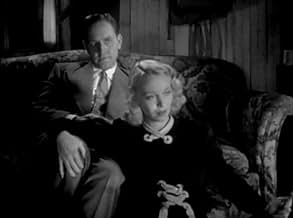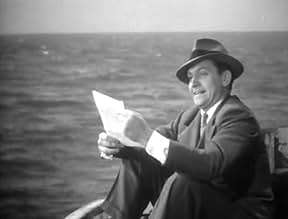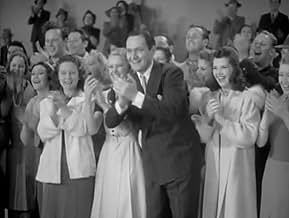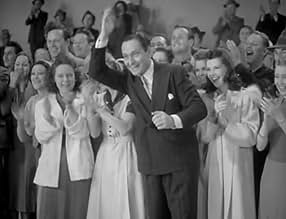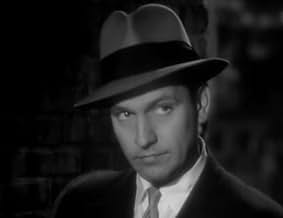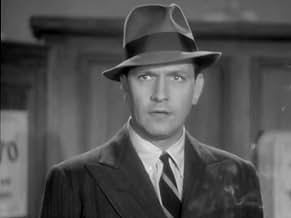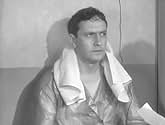IMDb RATING
6.5/10
707
YOUR RATING
A young heiress runs away from her overprotective grandfather. Penniless on the streets of New York, she manages to find employment, but a reporter knows her true identity.A young heiress runs away from her overprotective grandfather. Penniless on the streets of New York, she manages to find employment, but a reporter knows her true identity.A young heiress runs away from her overprotective grandfather. Penniless on the streets of New York, she manages to find employment, but a reporter knows her true identity.
- Director
- Writers
- Stars
- Nominated for 1 Oscar
- 1 nomination total
Syd Saylor
- Robinson
- (as Sid Saylor)
Ernie Adams
- Cafe Counterman
- (uncredited)
Ralph Brooks
- Cafe Customer
- (uncredited)
Horace G. Brown
- Ice Skater
- (uncredited)
George Burton
- Drayman
- (uncredited)
- Director
- Writers
- All cast & crew
- Production, box office & more at IMDbPro
Featured reviews
The part of the runaway heiress would have been right up Nancy Carroll's alley. Likewise, I think Virginia Bruce might have been more convincing in Ms. Carroll's part as a scheming shop girl that puts on airs. Ms. Bruce just didn't have the same air of mischief that Nancy Carroll did that could have really added a needed touch of spice to this movie.
Yes, there are similarities to "It Happened One Night" as everyone else has mentioned. There's a runaway heiress, a reporter in the know (Frederic March as Bill Spencer) that winds up falling for said heiress, even the heiress running away from the overbearing elder of the family - in this case her grandfather. However, everything else is pretty unique. In IHON Claudette Colbert's character was forced to live like an ordinary Depression era American in order to blend in with the crowd enough that she could get to her fiancée undetected by her father. Here, Joan Butterfield (Virginia Bruce) has an end goal of being one of those average Americans and standing on her own two feet.
The delight is in the details here - There's Patsy Kelly as Joan's friend, shop girl Peggy O'Brien, demonstrating a vibrating weight loss machine at work and when the electricity goes out in her small apartment, plugging into the flashing sign outside her window. Of course now it takes twice as long to cook dinner and all of her lamps are flashing on and off. Ms. Kelly is practically the third lead here, and her comic performance as Joan's mentor at living the working class life is pitch perfect. She's noisy and assertive as usual, but she doesn't go overboard. Alan Mowbrey as Peggy's boyfriend, a 40-something chiropractic student living across the hall from Peggy that works nights, is a great comic touch. The two humorously meet on the stairwell each evening for a passionate kiss, he as he heads off to work and she as she heads home from work. Not to be overlooked is Eugene Palette as Bill Spencer's perpetually agitated editor. He and March inflict every comic verbal insult possible on one another yet they just can't seem to live without one another - much like Daffy Duck and Bugs Bunny. In fact, I found that Palette and March had much more chemistry together than did Frederic March and Virginia Bruce.
This is one film where the scenery along the way is much more interesting than the ultimate destination as I felt the conclusion landed with a thud and seemed rather forced. Still I'd recommend it just for all the goofy stuff that you could only find in Hal Roach productions in the 30's. Ultimately it's a satisfying feel-good little film.
Yes, there are similarities to "It Happened One Night" as everyone else has mentioned. There's a runaway heiress, a reporter in the know (Frederic March as Bill Spencer) that winds up falling for said heiress, even the heiress running away from the overbearing elder of the family - in this case her grandfather. However, everything else is pretty unique. In IHON Claudette Colbert's character was forced to live like an ordinary Depression era American in order to blend in with the crowd enough that she could get to her fiancée undetected by her father. Here, Joan Butterfield (Virginia Bruce) has an end goal of being one of those average Americans and standing on her own two feet.
The delight is in the details here - There's Patsy Kelly as Joan's friend, shop girl Peggy O'Brien, demonstrating a vibrating weight loss machine at work and when the electricity goes out in her small apartment, plugging into the flashing sign outside her window. Of course now it takes twice as long to cook dinner and all of her lamps are flashing on and off. Ms. Kelly is practically the third lead here, and her comic performance as Joan's mentor at living the working class life is pitch perfect. She's noisy and assertive as usual, but she doesn't go overboard. Alan Mowbrey as Peggy's boyfriend, a 40-something chiropractic student living across the hall from Peggy that works nights, is a great comic touch. The two humorously meet on the stairwell each evening for a passionate kiss, he as he heads off to work and she as she heads home from work. Not to be overlooked is Eugene Palette as Bill Spencer's perpetually agitated editor. He and March inflict every comic verbal insult possible on one another yet they just can't seem to live without one another - much like Daffy Duck and Bugs Bunny. In fact, I found that Palette and March had much more chemistry together than did Frederic March and Virginia Bruce.
This is one film where the scenery along the way is much more interesting than the ultimate destination as I felt the conclusion landed with a thud and seemed rather forced. Still I'd recommend it just for all the goofy stuff that you could only find in Hal Roach productions in the 30's. Ultimately it's a satisfying feel-good little film.
After all the negative things I have heard said about this film, I was expecting something very...I don't know...boring, silly, empty. But I must say I was more than pleasantly surprised with it and I did enjoy it. I watched it because I just discovered Fredric March, and have watched over 30 of his films now. I must say that this film in no way provided him to display his marvelous acting skill, but still it was nice to see him do this bit of light comedy. I think the story is nice when you want to watch something that is not heavy, but lighthearted and fun with the usual 1930's "happily ever after" ending. It is something my children would enjoy.
Don't have much else to say, except if you like Fredric as much as I do, you will like this film. Too bad he only gave one kiss in this one!!
Don't have much else to say, except if you like Fredric as much as I do, you will like this film. Too bad he only gave one kiss in this one!!
Okay, so this is a copy of It Happened One Night. Big deal. There's actually a fair amount in it that is different. The basic elements are the same: Girl runs away from dad/grandfather and dodges the detectives but comes face-to-face with a reporter hiding his identity from her.
I would say that the primary difference between films is the attitudes of the leading men. Clark is essentially blackmailing Claudette in IHON, while in this film, Fredric doesn't seem to have any intention of publicising Virginia - he doesn't want to write the story in the first place, keeps delaying the finish of his story, and finally he rips it up and refuses to do it at all. In TGMH, there is also a strange but amusing supporting actress who works in the same store as Virginia does. Oscar Shapely of IHON is not her equivalent, though amusing in his own way, believe you me.
It Happened One Night is definitely the more solid of the two movies, but There Goes My Heart is fun to watch and should be more actively viewed than it is, instead of being condemned by a majority that probably hasn't seen it, but bases their opinions on the negative reviews of others. I myself was sceptical - I just watched it prepared to react whatever way the movie led me, and I have to say that I did like it and would definitely see it again.
I would say that the primary difference between films is the attitudes of the leading men. Clark is essentially blackmailing Claudette in IHON, while in this film, Fredric doesn't seem to have any intention of publicising Virginia - he doesn't want to write the story in the first place, keeps delaying the finish of his story, and finally he rips it up and refuses to do it at all. In TGMH, there is also a strange but amusing supporting actress who works in the same store as Virginia does. Oscar Shapely of IHON is not her equivalent, though amusing in his own way, believe you me.
It Happened One Night is definitely the more solid of the two movies, but There Goes My Heart is fun to watch and should be more actively viewed than it is, instead of being condemned by a majority that probably hasn't seen it, but bases their opinions on the negative reviews of others. I myself was sceptical - I just watched it prepared to react whatever way the movie led me, and I have to say that I did like it and would definitely see it again.
I think I liked this movie despite the rather formulaic and ridiculous plot because both Viginia Bruce and Frederic March did such a wonderful job with this romantic comedy from Hal Roach Productions.
Virginia is the grand-daughter of a very wealthy but extremely overprotective man. He won't let her go anywhere without him and sees danger around every corner. As a result, she is smothered and bored--aching to live a real life. She escapes and establishes a new identity as a regular working girl. However, reporter Frederic March finds out about the ruse and wants to exploit the woman for a buck. However, once they meet, sparks begin to fly and he is torn between riches and his new love.
You know about where the movie will end--after all, it's a formulaic romantic comedy from an era when the movies never dared stray from the expected course. However, how delicately and believably the stars follow this formula is what makes this film so worth watching. A cute and satisfying little film.
By the way, at the very end there is a cute little cameo by the silent screen star Harry Langdon as the preacher. While his best years in movies were long behind him, he did continue to do small roles in a variety of films over the years.
Virginia is the grand-daughter of a very wealthy but extremely overprotective man. He won't let her go anywhere without him and sees danger around every corner. As a result, she is smothered and bored--aching to live a real life. She escapes and establishes a new identity as a regular working girl. However, reporter Frederic March finds out about the ruse and wants to exploit the woman for a buck. However, once they meet, sparks begin to fly and he is torn between riches and his new love.
You know about where the movie will end--after all, it's a formulaic romantic comedy from an era when the movies never dared stray from the expected course. However, how delicately and believably the stars follow this formula is what makes this film so worth watching. A cute and satisfying little film.
By the way, at the very end there is a cute little cameo by the silent screen star Harry Langdon as the preacher. While his best years in movies were long behind him, he did continue to do small roles in a variety of films over the years.
...It doesn't entirely work, unfortunately. Fredric March is excellent, as always. What a fine and versatile actor! And Virginia Bruce is winning, as she always was. She plays an heiress, he a newspaper reporter sent to get a story about her. (This aspect presages the Bette Davis movie "Golden Arrows.") Eugene Palette, always a treat, plays his editor.
Bruce is not an ideal screwball heroine, unfortunately. Her pale, wistful beauty doesn't really lend itself to the genre, though she is dine in the movie. Patsy Kelly is hilarious as her pal: Bruce has sailed to Manhattan in her yacht while granddaddy is away. She finds herself in the City with no money. At a diner (kind of an Automat but not really) she and Kelly scam some food. Kelly picks her up! "If you don't have anywhere else to go, you can spend the night at my place." Kelly's ostensible romantic interest is Alan Mowbry, a neighbor who is studying to become a chiropractor by mail. What a couple they make! Back at the store where Kelly works, which Grandpa owns, we see Kelly demonstrating a device called "Vibrato." It's a kind of Sapphic intimation of the Vega-Meta-Vitamin sequence decades later from "I Love Lucy." The movie has a sterling supporting cast, which also includes Nancy Carroll, delicious as a jealous, catty fellow saleswoman.
It also, unfortunately, has afar too lengthy and pointless scene with Bruce and march at a skating rink. Why it was allowed to go on so long is a mystery. (There is a similar scene in one of Irene Dunne's lesser comedies -- "Joy of Living," I think.) The movie begins in a stylish, chic manner but it loses its way. It could have been in the top tier but as it is it's still fun.
Bruce is not an ideal screwball heroine, unfortunately. Her pale, wistful beauty doesn't really lend itself to the genre, though she is dine in the movie. Patsy Kelly is hilarious as her pal: Bruce has sailed to Manhattan in her yacht while granddaddy is away. She finds herself in the City with no money. At a diner (kind of an Automat but not really) she and Kelly scam some food. Kelly picks her up! "If you don't have anywhere else to go, you can spend the night at my place." Kelly's ostensible romantic interest is Alan Mowbry, a neighbor who is studying to become a chiropractor by mail. What a couple they make! Back at the store where Kelly works, which Grandpa owns, we see Kelly demonstrating a device called "Vibrato." It's a kind of Sapphic intimation of the Vega-Meta-Vitamin sequence decades later from "I Love Lucy." The movie has a sterling supporting cast, which also includes Nancy Carroll, delicious as a jealous, catty fellow saleswoman.
It also, unfortunately, has afar too lengthy and pointless scene with Bruce and march at a skating rink. Why it was allowed to go on so long is a mystery. (There is a similar scene in one of Irene Dunne's lesser comedies -- "Joy of Living," I think.) The movie begins in a stylish, chic manner but it loses its way. It could have been in the top tier but as it is it's still fun.
Did you know
- TriviaAccording to a New York Times article on 16 October 1938, the Citizen's Chiropractic Committee of New York State sued the film producers, authors and Alan Mowbray for $100,000 claiming damages to the profession. One doctor was very upset that the film implied it was possible to go through a chiropractic school through a correspondence course. The outcome of the suit is not known.
- Quotes
Peggy O'Brien: Just think, someday i'll be Mrs. Doctor Pennypepper E. Pennypepper... then I'll find out what the E. stands for!
- Crazy creditsThe opening credits are shown as if viewed through a ship's porthole with waves erasing each set of credits.
- SoundtracksA Life on the Ocean Wave
(1838) (uncredited)
Music by Henry Russell
Lyrics by Epes Sargent
Sung a cappella by Fredric March
Details
- Runtime
- 1h 23m(83 min)
- Color
- Aspect ratio
- 1.37 : 1
Contribute to this page
Suggest an edit or add missing content

